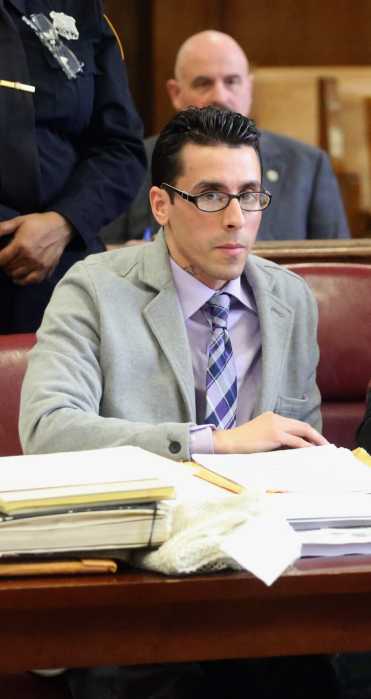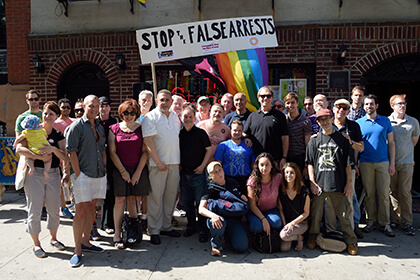BY DUNCAN OSBORNE | The Manhattan district attorney’s office is stitching together a case that relies on physical evidence and witness testimony showing that John Laubach feared Edwin Faulkner and Juan Carlos Martinez-Herrera, the two men charged in his murder, and prosecutors hope the jury will infer that the two men killed Laubach in 2012 when they bound him and covered his face with the duct tape that caused his asphyxiation.
“Normally, he came in smiling, laughing,” Miguel Mendoza, a nurse who worked for Laubach’s doctor, testified on October 2. In contrast, Laubach was “pacing back and forth, not being sociable with the staff” during a February 27 office visit just five days before the 57-year-old was found dead in his Chelsea apartment.
“He told me he had a knife in his backpack,” Mendoza said. “He was scared.”
Manhattan prosecutors argue John Laubach talked of past violence, carried a knife for protection
Laubach had sex with Faulkner, 33, and Martinez-Herrera, 35, many times, paying the two amounts ranging from $20 to $40. In the late winter of 2012, he accused the gay couple of stealing from him. Mendoza told police that Laubach said he and the two had a “physical altercation” during which Laubach displayed a knife and demanded that they return two sets of cufflinks that they had taken. The two agreed to return the cufflinks.
Instead, the prosecution is alleging, they returned and bound Laubach, covered his face with duct tape, and ransacked his apartment. They fled with Laubach’s property to Florida, where they were arrested weeks later, on March 15 .
The two are charged with second-degree murder in that they acted with depraved indifference, not that they intended to kill Laubach; felony murder, based on the allegation that they caused Laubach’s death in the course of committing another felony; and kidnapping and robbery, the charges that form the basis for the felony murder charge.
The prosecution has at least some of the property taken from Laubach’s home that Faulkner and Martinez-Herrera had in their possession when they were arrested in Florida. They have video and other records showing them trying to take cash from Laubach’s bank account with his ATM card. And prosecutors have fingerprint and DNA evidence that places Faulkner and Martinez-Herrera in the apartment.
Critical evidence came from Dr. Jason Graham, the first deputy chief in the city medical examiner’s office, who testified that Laubach’s death from asphyxiation was caused by the tape placed on his face. Additionally, Laubach had “recent injuries” to his head and an elbow that could have occurred during a struggle.
The defense has countered with various explanations for Laubach’s death, including that he had a heart attack that killed him during sex with Faulkner and Martinez-Herrera and that the tape was applied after his death.
“There’s no evidence of that,” Graham said, referring to the suggestion Laubach had a heart attack, during his October 2 testimony. Nor was there any evidence that the victim had been strangled or put in a chokehold, Graham said.
There is no eyewitness testimony to the killing since the prosecution is not using a statement Faulkner gave to police in which he asserted that Laubach’s death was an accident that came during kinky sex.
Faulkner implicated both himself and Martinez-Herrera in that statement, and the only way Martinez-Herrera could refute it is by calling Faulkner to the stand. The US Constitution bars compelling a defendant to give evidence against himself, and Faulkner would likely have to do so if he took the stand. But the statement would have boosted the defense case by offering an alternative theory for Laubach’s death.
Without that statement, Bonnie Wittner, the judge in the case, has repeatedly barred the defense from asking about kinky sex or the possibility that Laubach wanted to be bound and have his face covered with tape. That has led to some fireworks in court.
When Daniel Parker, the attorney for Martinez-Herrera, began to ask Graham, “If a person voluntarily agrees to be choked,” that drew an immediate objection from Lanita Hobbs –– who is prosecuting the case with Juan Abreu. The objection was sustained by Wittner. With the jury out of the courtroom, the judge and the defense attorney had one of several heated exchanges, including one in which Wittner threatened to hold Parker in contempt.
“I don’t understand what it shows other than it prejudices the jury,” Wittner said of the kinky sex defense. “I’m sorry, but I think that’s what you’re trying to do, and I don’t think it’s proper.”
Parker responded, “What I’m trying to do is elicit relevant evidence.”
Before questioning of prospective jurors began in Manhattan Supreme Court on September 21, Parker said he wanted to tell jurors that Laubach was HIV-positive and that he had two suicide attempts and had been treated for depression. Wittner would not allow it. At that time, the defense theory was that paraphilias such as erotic asphyxiation are associated with mental illness, including depression, and suicide.
During prospective juror questioning, attorneys will often introduce evidence that reflects badly on a crime victim or a defendant, and this case was no exception. Hobbs’ description of Laubach bordered on homophobic as she called him “promiscuous.” Laubach was “attracted to younger men” and “He was interested in teenagers,” Hobbs told jury candidates.
A fuller portrait of Laubach emerged with more witness testimony.
Paul Bridgewater, who knew Laubach for 25 years, said, “He was one of the gentlest people I ever knew” during October 2 testimony. Bridgewater, a private art dealer, met Faulkner and Martinez-Herrera when he went to Laubach’s apartment to hang some artwork.
Laubach began paying for sex out of concern over his appearance.
“He had AIDS,” Bridgewater said. “The medications he was taking gave him a pot belly. He had a stroke, he was limping. After that, he started paying for sex.”
On October 10, Ronald Pawlik, a neighbor, said that Laubach was “always pleasant, he seemed to always have a smile on his face.”
The prosecution is expected to end its case on October 14.



































